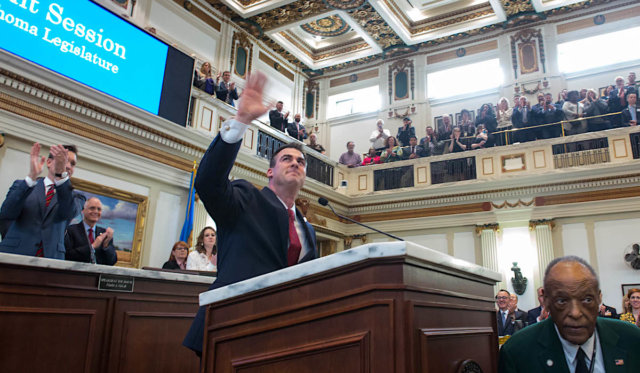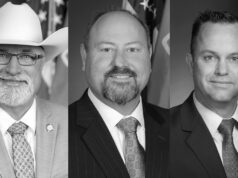

Oklahoma Gov. Kevin Stitt vetoed three bills Monday night and a fourth Tuesday evening. His actions halt legislative efforts to authorize hunting guides on public land, to create a state definition for “instructional expenditure” by schools, to allow a process for certifying local police and fire unions and to increase benefits for lower-salary state workers.
Among the four Stitt vetoes, his action on SB 566 appeared to draw the most reaction, with some hunters celebrating in Facebook groups such as Oklahoma Wildlife and Outdoor Recommendation Legislation Updates. The bill would have authorized private hunting guides on lands owned or managed by the Oklahoma Department of Wildlife Conservation, with the agency allowed to promulgate rules.
“The use of department lands, paid for with fees, monies, or funds, for the monetary gain of private companies is not permitted pursuant to the Oklahoma Constitution,” Stitt wrote in his veto message, citing Article 26 Section 4. “In addition, significant portions of department managed lands are not department owned and are subject to specific terms of the applicable agreements between the department and the land owners.”
The bill’s authors, however, believe the non-appropriated agency could have crafted administrative rules to protect intent and avoid constitutional issues. Rep. Kevin McDugle (R-Broken Arrow) added that the agency already manages guides on Oklahoma waters and his bill was intended to regulate “illegal operators” who are already guiding groups of hunters on public lands.
“Having no rules for guides on public lands I think is just crazy,” McDugle said. “They’re taking these guys to hunt, they’re taking them on public land, and the state is losing money. All I wanted was for the state to set up guidelines and a program so that people who do want to guide could actually pay for a license that the state would make money off of, and the state would better be able to control what’s going on.
J.D. Strong, executive director of the Oklahoma Department of Wildlife Conservation, said his agency was ultimately neutral on the bill, though he had voiced concerns before Sen. Casey Murdock (R-Felt) amended the bill to allow ODWC to promulgate rules.
“We did recognize early on that this probably wasn’t going to be very popular among our community of hunters who depend upon public land as their only way to get out and pursue their sport and meals for their tables,” Strong said. “I think the majority of the concerns were probably along the lines that they might get run over by too many guides having too many people out on those public lands because they would have the opportunity to make some money.”
Strong said hunting guides offer knowledge of hunting areas and equipment — such as bird dogs — for groups of people to hunt and “usually have a lot more luck finding game.”
John Bellah, a Midwest City resident who primarily hunts quail and doves, was among those calling for SB 566’s veto.
“My opposition was basically that I think it would create a situation where, for the average hunter, the overall quality of the hunt would be diminished due to competition in the field with guides,” Bellah said. “When it comes to quail hunting, if there are quail guides, they are going to be concentrated on very few of the wildlife management areas. On one particular piece of ground, it might be too much.”
McDugle said that concern could have been addressed through the agency rules that would have been authorized by SB 566. Murdock agreed.
“I think that these rules (limiting scope) would have flown through. I honestly think they could have promulgated rules to SB 566 that would have benefited everybody,” Murdock said. “What I see in this bill — why I pushed it so hard — is I see an opportunity for people in rural Oklahoma to start a business.”
Strong and Bellah said comparisons to other states that allow guided hunting on public lands are unfair, considering the millions of acres designated wildlife management areas in the West.
“We’re a far cry from the Colorados and the Wyomings when it comes to public hunting land,” Bellah said. “Colorado has a lot more public land than we do.”
Still, McDugle and Murdock expressed disappointment in Stitt’s veto.
“My only aggravation with the governor’s office veto is that they didn’t call me. They didn’t text me. They didn’t email me. They didn’t ask anything before they vetoed it,” McDugle said.
Murdock said he received a call from Secretary of State Michael Rogers after the veto. McDugle said a veto override attempt would be unlikely.
“We don’t have the votes for an override,” he said.
Police, fire union certification option axed
Stitt also vetoed HB 1968, which would have created a Department of Labor mechanism for the state to certify new local police and firefighter unions. In 2017, Gov. Mary Fallin vetoed a bill reauthorizing the Public Employee Relations board, making it more difficult for police and fire department employees to unionize.
“HB 1968 would insert state government into contract disputes between firefighter and police officer unions and municipalities,” Stitt wrote in his veto message. “These disputes are best resolved through arbitration, as currently provided in statute. The insertion of state government in these disputes is improper and not in the best interest of Oklahomans.”
Scott Van Horn, president of the OKC Firefighters IAFF Local 157, responded to Stitt’s veto message, saying the bill would also have provided another mechanism for dispute resolution.
“According to the governor’s statement, he vetoed the bill to keep state government out of municipal disputes,” Van Horn said. “However, the Fire and Police Arbitration Act calls for a Public Employee Relations Board to settle some of these disputes.”
With PERB sunsetting in 2017, Van Horn said “the only recourse is to go through the already overtaxed court system.”
“Fire and police leaders worked together with municipalities on this bill to help keep court costs down,” Van Horn said. “It is apparent from their statement that the governor’s office did not understand.”
State, federal alignment issues kill SB 44
Stitt also vetoed SB 44, which would have created a new definition for common education expenses in Oklahoma.
“SB 44 would define the term ‘instructional expenditure’ to mean expenditures for instruction and instructional staff support services, including those that directly relate to providing instruction for activities that assist with classroom instruction,” Stitt wrote in his veto message. “The definition proposed does not align our state with the federal definition of instructional expenditure, which will not allowed Oklahoma to measure our instructional expenditures across state lines.”
Sen. J.J. Dossett (D-Owasso) contradicted the governor’s interpretation, saying SB 44 would have aligned Oklahoma’s definition with federal terminology.
“The measure would make sure we are considering all school personnel whose job includes direct interaction with students as an ‘instructional expenditure,'” Dossett said, pointing to librarians as an example.
Boost for lower-salary state employees vetoed
Tuesday evening, Stitt issued another veto, striking down HB 2465 that would require state agencies to pay overtime to workers earning less than $31,000 even when compensatory time is available.
Stitt issued a lengthy veto statement, saying he wanted to work with bill authors — Rep. Jason Dunnington (D-OKC) and Sen. Paul Rosino (R-OKC) — to address the issue across various state agencies.
Stitt wrote:
HB 2465 would, in part, require agencies to pay employees for overtime worked, even if said work was unapproved by the agency, and mandate certain employees be paid overtime instead of compensatory time, regardless of the desire of the agency or the employee. State employee pay and benefits, including overtime pay and compensation time, is critical to ensuring Oklahoma retains the best and brightest in state government. Unfortunately, there are not across the board policies for all state agencies and employees, currently in statute. Although HB 2465 attempts to standardize a fraction of these issues, I believe a broader conversation needs to occur whereby we develop uniform across-the-board policies for state agencies and employees and I am committed to working with the authors of the bill to develop such policies and any necessary legislation.
Sterling Zearley, executive director of the Oklahoma Public Employees Association, sent out a statement Wednesday morning.
“Many state employees are required to work overtime due to short staffing in their workplace and they can’t take comp time because of the same staffing issues. These employees work overtime yet are not compensated for it. HB 2465 would have taken care if the issue for some of those employees,” Zearley said. “If you work overtime that is approved by your supervisor but your workload won’t permit you to take comp time, you should be paid for it. Some state jobs require overtime work and to not pay those employees for that work is wrong.”
(Update: This story was updated at 10:30 a.m. Wednesday, May 1, to include comment from Zearley.)




















